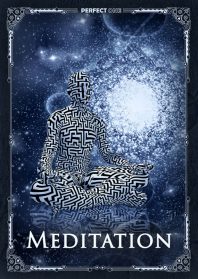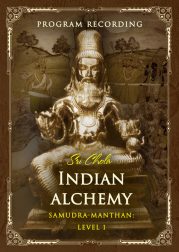Meditation

Meditation is a specific state of the mind. It is a way of interacting with the nature of observation, attention, concentration and focus that involves various efforts of the brain and consciousness. The concept of meditation involves different levels of process fixation, various experiences and states, diverse conscious activities. Meditation refers to a certain state of absorption characterizing the meditative consciousness, which is described by the concept of samadhi (samādhi, समाधि).
Through meditation, as a special type of conscious activity, we can penetrate into the inner meaning of what is being contemplated. Meditation is a kind of harmonious state of the mind, a state free from contradictions. These contradictions can be replaced by comparison, which divides meditation into different classes of perception, as described in the texts of the Bhagavata Purana or the Vishnu Purana, considering the principles of meditation according to Indian alchemy. In this view, meditation is the process of operating with the mind, where Saṃprajñāta (संप्रज्ञात) is a state when the mind is absorbed in contemplating an object that remains distinct, in contrast to Asaṃprajñāta (असंप्रज) when the distinction between the knowledge and its object is eliminated.
This serves as the basis for the establishment of centres of attention and methods for development, as well connections between meditative actions and the tasks on the path of liberation (expressed in Buddhism by the concept of nirvana). This requires that we maintain a unified state and be integrated into the task (be absorbed), both before and during the meditation.
In this way, meditation becomes a kind of all-encompassing tool, on the one hand, and on the other hand, it is a path to individualization, if consciousness rises higher than even the state of samadhi, considered not as the highest state, but as an object of meditation.
This means that depending on the direction of the path, the state of samadhi can be considered as something final or as a preliminary stage. The question is whether we are following the path of liberation (yoga), the path of tantra, or the path of alchemy. Samadhi is an important tool in terms of self-realization and nirvana.
To understand the various qualities of the meditation state, we need to consider the concept expressed in yoga as saṃyama (संयम). This concept includes three qualities of meditation – dharana, dhyana and samadhi. These differ in the power of contemplation, the tasks of contemplation, and in the involvement of different parts of the body in this process (not only the head). In classical Indian yoga, described by Patanjali (III-II century BC) in the treatise Yoga Sutra, these are the sixth, seventh and eighth steps out of a total of eight steps. That is, classical yoga is an eight-step system (aṣṭāṅgayoga, अष्टांग योग). In fact, all eight stages of development in classical yoga (yamas, niyamas, asanas, pranayama, pratyahara, dharana, dhyana and samadhi) can be considered as meditative practices of different quality.
The dhāraṇā stage (धारणा) literally translates from Sanskrit as “retention” and reflects the process of focusing, retaining and striving to dive into an even deeper state. Dhyāna (ध्यान) is the embodiment of this task, deep immersion in meditative contemplation. Samādhi (समाधि) is already a state of complete merging of subject and object, a state of realization of meditation tasks in the context of yoga goals.
Psychophysical work is important for the alchemical path, and it is fulfilled through the meditation Samudra Manthan (Churning of the Milky Ocean, समुद्र मंथन), associated with the awakening of energy (different from kundalini), as well as with the accumulation of energy, the process of churning, etc. This is also used in many forms of flow meditation – for example, aditya.
The ability to maintain awareness is important for acquiring meditative experience, as the meditative state leads to numerous experiences, including out-of-body and mystical experiences.
The meditative state offers a way to control our consciousness (regardless of the state of the mind during the process of meditation). From an alchemical standpoint, meditation is a special process for developing the mind. It is even not considered a practice, but a function, a condition for the realization of a certain idea for controlling consciousness and energy. Mediation creates different types of development, like rays emanating from an active source.
In this context, the main task of meditation is to reveal, show, guide, suggest a tradition and method. Meditation is a single concept and at the same time a set of functions, with its own philosophy. This philosophy is based both on actual forms of concentration and mysterious forms of observation, and its main tool is attunement.
Meditation not only determines thought, but also initiates and shapes the development of consciousness. The ability to think, to concentrate is a property of the brain, which is the main instrument of meditation. The prenatal nature of any development requires the ability to listen, contemplate, process true perception. Meditation combines the similarities and differences in the functioning of consciousness. At the same time, it is a state of the mind, which can thus be considered a Meditation Brain. This state of the mind is inherent, for example, in many aboriginal groups whose members live in a visionary or medium state.
Thus, meditation is both a state of consciousness and a way of working with your mind in practice. Meditation is an effort associated with physical restructuring, and even a change in the geometry of the brain.
Meditation work is characterized by various types of immersion caused by the different types of influence exerted on the consciousness, similar to totem and egregor conditions, e.g. the process is dependent on an external, third force. These conditions include, for example, visiting sacred places or places of power. This is similar to the rational idea of being in an altered state of consciousness, that is, in a state altered in relation to the existing, basic one.
It is important not to confuse this with the altered state associated with rational actions, such as taking drugs, which lead to the inability to operate the brain, when the mind can only observe. However, the concept of observation (the original one that predetermines the basic possibility of the meditative process) is a crucial and primary ability of the mind.
Meditation is a certain order of energy, which comes from everyday life and helps to form stable ideas that affect our behaviour. We must keep in mind that the quality of meditation always depends on the prenatal and postnatal processes. Meditation quality is often determined by the deep relationship between acquired and existing reflexes, including the interaction with one’s own communication language.
Thus, meditation may be considered as our right to operate with our brain, a manifestation of the strength of our mentality and the independence of our brain from destruction, caused not only by lower vibrations, but also by higher ones. A lot here depends, naturally, on our upbringing and education. The ability to stop thoughts, as well as the ability to think, determines the ability of the brain to do certain meditative work.
The primary task of meditation is to bring the brain to an understanding of both random, temporal phenomena and timeless ones. The true conceptual value of meditation lies in the knowledge of the nature of your mind, in the ability of the brain to perceive its purpose in life and to comprehend in depth human nature and the surrounding space.
Thus, meditation is a non-trivial concept, not only in terms of types of state, but as a name to which everyone ascribes something different according to their own perception. It is important to classify meditation according to the processes it involves, both rational and irrational.
Thus, meditation can be classified according to the type of functions:
- Connecting consciousness, brain and mind
- Connecting Perceived to Process
- Focusing on the process
- Fixing the process
- Inner control
- Ecstatic state
- The state of no-mind
- Meditative tonality
- The nature of truth
- Transcendence
- Timelessness (transcending time)
- Transcending space










